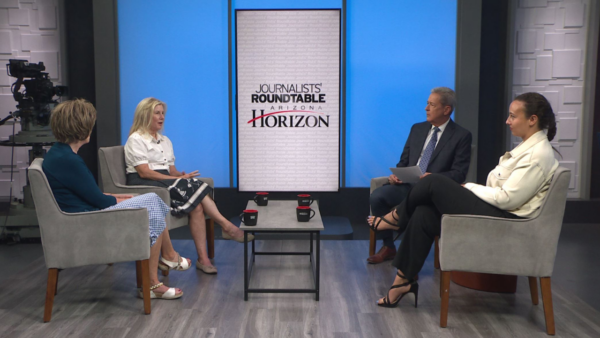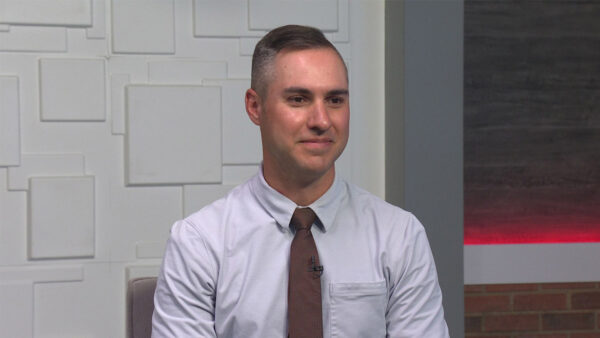The Banner Alzheimer’s Institute in Phoenix has launched a research initiative to treat Alzheimer’s disease before symptoms appear. Doctors Eric Reiman and Pierre Tariot discuss the Alzheimer’s Prevention Initiative.
Ted Simons: The Banner Alzheimer's Institute in Phoenix is working to stop Alzheimer's disease from claiming yet another generation of victims. The institute launched the Alzheimer's Prevention Initiative to conduct clinical trials for people at high risk for developing dementia due to Alzheimer's disease. Here to talk with us is Dr. Eric Reiman from the Banner Alzheimer's Institute, and Dr. Pierre Tariot, the institute's associate director. Thanks for joining us.
Eric Reiman and Pierre Tariot: Thanks for having us.
Ted Simons: What are we talking about here in grand scope?
Eric Reiman: We think now is the time to launch the year of Alzheimer's prevention research. We think there are a number of ways to reduce the risk of Alzheimer's disease but we need a rapid way to evaluate them and find out which treatments work. Right now it takes too many healthy people and too many years to conduct trials to see what develop symptoms. We think we can accelerate that process and see what works sooner than you might think.
Ted Simons: Explain what that means, these kinds of trials?
Eric Reiman: We use the term pre-symptomatic treatment to refer to intervention that is started before people develop memory and thinking problems. It is designed to reduce the risk or completely prevent those symptoms from occurring.
Ted Simons: How do you figure out who these people are? Who qualifies?
Pierre Tariot: The way we're proposing is genetic background. So there are certain genetic profiles that you can have that increase your risk. We can even predict about what age the symptoms will emerge.
Ted Simons: So when you look for a genetic background, is there -- for us laymen, is there a single gene? Is there something -- what exactly are you looking for?
Pierre Tariot: So to oversimplify the story a little, there are a few rare mutations in your genes. If you have one of those, you are going to develop what's called early-onset Alzheimer's disease. It will happen if you live long enough. That's one type. The other major type is what Eric refers to as the susceptibility factor. It's a genetic variation, not a mutation, that makes it more likely that you will get late-onset Alzheimer's disease, particularly if you have two copies, one from mom and one from dad. If you have two of that particular type of variation, and you're above let's say the age of 60, your odds are close to getting Alzheimer's disease in the next 10 years or so.
Ted Simons: My goodness. We have a graphic showing -- correct me if I'm wrong here -- someone with symptomatic Alzheimer's. And then a young adult on the right now, the young adult, is that the one that looks like -- that is brain activity there, right?
Eric Reiman: So you're looking at brain maps that we've generated using an imaging technique so that we can peer into the head and study the inner workings of the brain. We have seen these characteristic reductions in brain activity from people with Alzheimer's activity. On the right, young adults who carry this common gene that one out of four of us have, almost five decades before the average age of onset of symptoms.
Ted Simons: 90% at 60 and 70 years of age, that's pretty certain stuff. Seems like Alzheimer's was full of question marks in the past. Getting to learn more all the time?
Eric Reiman: There's tremendous progress being made in the scientific understanding of Alzheimer's disease. The understanding of both genetic and non-genetic risk factors, and the discovery of promising but not yet established ways to slow down the disease itself.
Ted Simons: There are a lot of images on this one. This deals with plaque, if I'm not mistaken. What are we looking at?
Pierre Tariot: Amyloidal plaque is a term that referred to abnormal protein deposits that occur to the brain, outside of the brain cells. At the very bottom of the picture are two images of a brain, of a person with Alzheimer's disease, showing dense amyloidal plaque deposition. At the top is somebody completely free of plaque. The next one is a person with one copy of the susceptibility gene. They are already showing this early plaque deposition. The next is someone who's memory and thinking is okay but they have two copies of the gene. It's showing the evolution of the deposits of these proteins over time as the disease progresses.
Ted Simons: Interesting stuff. Let's define some terms here. The difference between dementia and Alzheimer's disease, talk about that.
Eric Reiman: Dementia refers to a disabling impairment in memory and other thinking abilities. There are a number of causes that could account for this impairment in memory and thinking abilities. In Alzheimer's disease, it accounts for about 60% of people who have that problem late in life. We do a medical evaluation to characterize the extent to which somebody has memory and thinking problems, to consider some of the reversible contributions to those problems, and to also help determine whether somebody has Alzheimer's disease or a different form of memory and thinking problems.
Ted Simons: How do you -- someone's concerned about their memory or thinking right now.
Pierre Tariot: Uh-huh.
Ted Simons: Are there warning signs that are specific? We've learned so much. Used to be you didn't know. Are there warning signs now?
Pierre Tariot: Sure. If your wife starts to tell you, you know, honey, I told you that over and over again; there are really obvious deficits in remembering recent events, and it's getting more noticeable over time, that would be a trigger, losing the ability to make decisions effectively. Having more trouble managing financial or legal affairs, trouble driving. Maybe one of the ones that we should pay more attention to is changes in emotions. Turns out that can occur very early. Somebody's in their seventies and they start to be unusually depressed or cranky, that could be a clue, as well.
Ted Simons: And the idea of something causing Alzheimer's disease, or conversely a way to prevent Alzheimer's, where are we with that?
Eric Reiman: The progress has been rather significant. Based on these genetic discoveries and understanding some of the molecular processes that lead to abnormalities like plaques in the brain, we have a number of promising investigational and imaging therapies. Some of those target those plaques. They are being studied in many treatments in patients who already have symptoms. The concern is that some of these treatments might be too little, too late to have their most profound effect, until we start them before people develop symptoms and the disease has ravaged the brain.
Ted Simons: And thus the importance of finding out, getting the pre-symptomatic situation figured out, to know to go ahead and head this thing off at the pass a little bit.
Eric Reiman: Yes.
Ted Simons: As far as the trials and studies, looking for bio-markers obviously. When does all this start?
Pierre Tariot: We're in the planning stages now. Some key events have happened. We have found very visionary donors to kick-start this process, which has allowed us to begin creating registries of potential participants in the United States, as well as in a country in South America where there are a lot of folks with the early onset gene mutation.
Ted Simons: Talk about that quickly, a family in Columbia you're looking at?
Pierre Tariot: So there is a genetically isolated group of families that have lived in the same region in the state of Antiocia, Colombia, the family has been there for hundreds of years, haven't moved far away. There are 25 extended families numbering about 5,000 people. Among those, roughly 40% carry this genetic mutation.
Ted Simons: Have they had experience with Alzheimer's? Have the older --
Pierre Tariot: Absolutely. So every generation, half of every generation develops the disease at a very young age, in their forties.
Ted Simons: That has to be very important information.
Pierre Tariot: Yeah.
Eric Reiman: We already had a sense of urgency. We need to find a way to prevent this disorder for all of us. But you cannot help but visit these families and have a heightened sense of urgency to do something about it now. The stakes couldn't be higher. But in some respects the opportunity couldn't be greater right now.
Ted Simons: Talk about the collaborative nature of the initiative. Who are you working with, and talk about that process.
Eric Reiman: The Alzheimer's Prevention Initiative is an effort where we are collaborating with researchers not only with Colombia, but the United States and Europe. Here in Arizona we have been able to capitalize on some complementary strengths at each of our academic institutions around the state. We have the country's leading statewide collaboration known as the Arizona Alzheimer's Consortium. The early detection and tracking of the disease, and working on how to prevent it is occurring right here in this state.
Ted Simons: Someone listening, if they want to be part of the study, or want to know if they qualify to be part of the study, what do they do?
Pierre Tariot: Google Banner Alzheimer's Institute. We have a web page devoted to the prevention effort. For those not on the internet, 602-839-6900, that'll work, and ask for the prevention initiative.
Ted Simons: And obviously their DNA, there will be a sample to work with?
Eric Reiman: Ultimately we want to gather some information about our volunteers, collect DNA, and think about who would be suitable. People who would be interested in participating in prevention trials and other kinds of clinical research. In addition to participation in studies like we have going on in the Alzheimer's Prevention Initiative, there are other studies going on in which we want to make a transformational difference in the fight against this terrible disorder.
Ted Simons: Very good. Thank you both very much, good stuff.
Eric Reiman: Appreciate it.
Dr. Eric Reiman;Dr. Pierre Tariot;























